Gamescom
Fun is guaranteed
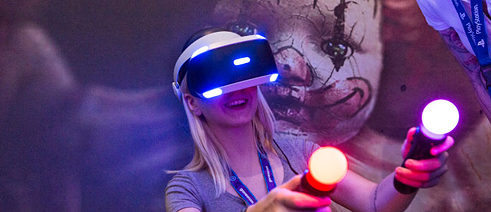
Gamescom “Virtual Reality” | © Koelnmesse
Virtual and augmented reality, serious -and indie games were just some of the topics that kept us busy at Gamescom. But first and foremost we had some pretty interesting encounters with exhibitors and experts from Great Britain, Sweden, the United States and Turkey.
Barriers for visitors
Almost nobody complied with the Gamescom administration’s request for leaving one’s bag at home, as it would be hard to fit camera, notebook and drinking bottle inside your back pocket. But starting from day two, the Gamescom administration acknowledged these weaknesses and amended appropriately: With extra queues for trade visitors and bagless people waiting time was under 2 minutes. While the disguised visitors weren’t allowed to bring along any weapon replicas, the exhibitors’ cosplayers were heavily armed nevertheless. It may be possible that armed exhibitors appear to be more innocuous than visitors, but at least for the sake of piety for the recent days’ events, I asked myself whether a general ban of weapon replicas would’ve been more appropriate.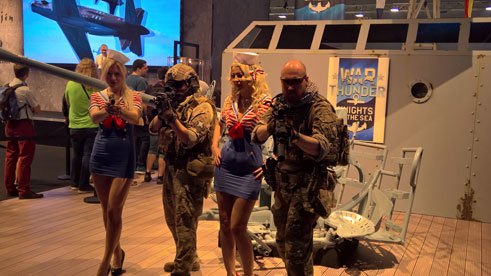 Cosplayer, wearing costumes that represent Fantasy-characters
| Linus Völkner
While I noticed the one or other booth with rather half-baked concepts last year, I even found the IndieBoothArena to be well structured this year. For instance, it was possible to buy discounted coupons, which could later be redeemed for games at every indie game developer’s booth.
Cosplayer, wearing costumes that represent Fantasy-characters
| Linus Völkner
While I noticed the one or other booth with rather half-baked concepts last year, I even found the IndieBoothArena to be well structured this year. For instance, it was possible to buy discounted coupons, which could later be redeemed for games at every indie game developer’s booth.Gamescom VR (“Virtual Reality”)
The market-ready VR solutions of HTC (“Vive”), Oculus (“Oculus Rift”) and Sony (“Playstation VR”), which are obtainable already or within in a short while, put forward concrete games instead of mere concepts and impressively show us how far technology has advanced already. With the new graphics cards of AMD and possibility to use a VR-headset on a gaming console, embarking the World of VR has become much than just a year ago (aside from Google’s 15€ DIY “head set” Cardboard).One of my personal highlights was the possibility of trying out Microsoft’s HoloLens which somehow seemed surreal, yet natural. The transparent goggles do not replace reality, as its VR equivalents do, but displays additional content (so-called “augmented reality”). Microsoft also managed to fit the necessary computer inside the goggles, which enables you to use them wirelessly.
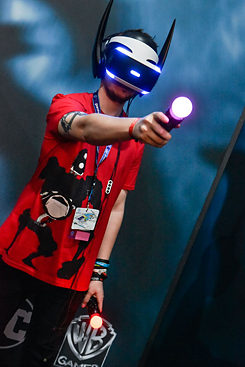 Virtual Reality "Batman"
| © Koelnmesse
Virtual Reality "Batman"
| © Koelnmesse
Gamesdevelopers from all around the world
We were able to interview two representatives of this year’s guest country Turkey: Ali Erkin, who is CEO of the Turkish game developers association TOGED, as well as Cansu Tatar who is a game designer and works for company Simsoft. “As Turkey is mainly focused on mobile games at the moment, […] we do also offer a variety of serious games.”, says Mr Erkin and Ms Tatar adds: “Game development in Turkey is easier than in other countries, as the government provides us with financial support.”With her contagious excitement for every little detail of Rudolf Kremer’s (Eufloria) new realtime-strategy game Neopolis we could’ve listened Tracey McGarrigan from Omni Systems Ltd. all day long. For the way home to England, the bubbly person rode her bike to collect money for a good cause, supporting the organisation GamesAid. Her only apprehension: “I hope that I will deal better with those mountains than I did last year.” I wish there were more likeable power women like her, in the male dominated gaming industry.
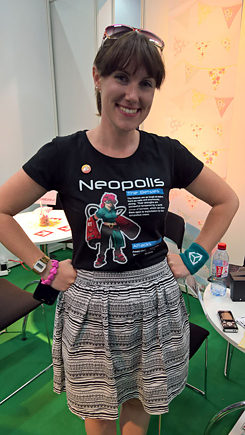 Tracey cycled to England for Fundraising
| © Linus Völkner
Tracey cycled to England for Fundraising
| © Linus Völkner
Talking to Swedish Game Developer Brjánn Sigurgeisson we found this emphasised. He pledged for video games to be treated as art and that parents should control the video game consumption of their children reasonable. Asking why his game has so many German words in it, he replied: “German just sounds cool”.
The Goethe Institut was happy to welcome the tweeting game developers from Jakarta and Goethe Institut’s Boston subsidiary was also able to invite experts from New England to Cologne as part of the project “Transatlantic Gaming Summit”, which was supported by the German Federal Foreign Office.
The guests from the MIT Game Lab and the umbrella organisation Mass Digi were amazed: “From Retro-Games over diversified indie games to big Triple-A-Games: The variety and variance of Gamescom should please everyone” says Richard Eberhard, director of the MIT Game-Lab.
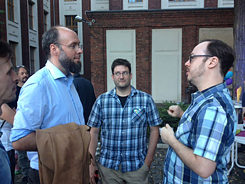 Intercultural dialogue: Richard Eberhard, CEO of Mit game lab, talking to Johannes Kristmann, gamesdeveloper at Maschinen-Mensch
| © Christoph Mücher
Intercultural dialogue: Richard Eberhard, CEO of Mit game lab, talking to Johannes Kristmann, gamesdeveloper at Maschinen-Mensch
| © Christoph Mücher
For my last day in Cologne I decided to leave the fare early, to visit the Gamescom City Festival, which sadly wouldn’t really start until the evening hours. I therefore decided to see the Cologne Cathedral which simply amazes without needing any gadgets. The south transept window, which was rebuild by artist Gerhard Richter in 2007, should appeal to gamers with a liking for pixelchic as well, as it is made of 11,500 square pieces of coloured glass.
Now I'm looking forward to the ideas of the games industry in the next year.